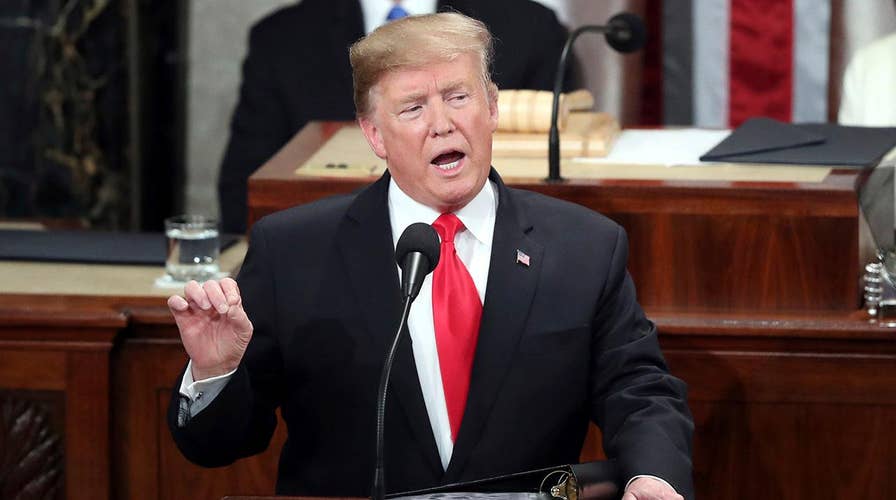State of the Union Address, Part 1: Trump challenges Congress to choose between greatness or gridlock
President Trump says an 'amazing quality of life' for all Americans is within reach if we reject the politics of resistance and embrace the boundless potential of cooperation.
In his State of the Union address Tuesday night, President Trump’s conciliatory tone on American leadership during World War II and Holocaust remembrance was a reassuring sentiment that our country needs to hear and that goes beyond this address.
But it’s concerning that the president’s current negotiating position on immigration makes conciliation and bipartisan unity very difficult.
In his address, President Trump maintained the position he has long held, saying: “Simply put, walls work and walls save lives. So let's work together, compromise, and reach a deal that will truly make America safe.”
TRUMP URGES BORDER WALL IN STATE OF THE UNION, SAYS TOLERANCE FOR ILLEGAL IMMIGRATION IS ‘CRUEL’
The president did not explicitly declare a national emergency to build a wall on our southern border. But he continued to make its construction a deal breaker for future government funding and immigration reform –with no mention of the millions of undocumented immigrants seeking opportunity in the United States.
President Trump’s continued support for a southern border wall only divides the nation. Not only that, but public support for the wall has declined, according to the most recent polling.
According to this month’s latest Gallup Poll, only 40 percent of Americans favor significantly expanding the construction of walls along the U.S.-Mexico border. Despite this, the focal point of President Trump’s agenda remains building a wall.
Allowing a position held by only a shrinking number of voters to guide national policy is no way to govern and dramatically harms the rest of the Trump agenda.
The real test for President Trump will be to unify the country, despite his increasingly divisive policies. The president is correct that the U.S. needs increased border security – but he and congressional Republicans must work with Democrats and find compromise if they hope to achieve their goals.
And I would encourage the Democrats to reassess their position as well.
Since the 116th Congress began and the partial government shutdown over border wall funding has temporarily ended, the Democrats have not shown a willingness to negotiate on the issues that need to be addressed.
Specifically, House Speaker Nancy Pelosi, D-Calif., and Senate Minority Leader Chuck Schumer, D-N.Y., have done little to move toward a middle ground with the president on both physical and technological border security, as well as protections for the undocumented immigrants living and working in our country.
It is clear in both practical and legislative matters, as well as in public opinion, that the partisan bickering on immigration must come to an end.
The Gallup poll this month also found that 81 percent of Americans support a pathway to citizenship for those currently in the country illegally. This is the type of action we need to truly get the country moving forward on the issue of immigration.
More promisingly, there is the opportunity for President Trump and Democrats to work together on infrastructure investments, as he said he wants to do in his State of the Union address.
In his proposal for a national infrastructure investment plan, President Trump recommended we work in a bipartisan way “on legislation to deliver new and important infrastructure investment, including investments in the cutting-edge industries of the future.”
In fact, this closely mirrors the same plan Sen. Bernie Sanders. I-Vt., proposed on the 2016 presidential campaign trail. Trump’s emphasis on infrastructure indicates that two of the most prominent leaders from opposite sides of the partisan and ideological spectrum can find opportunities to pass much-needed legislation.
The president also highlighted his new prescription drug pricing plan, saying: “We should also require drug companies, insurance companies, and hospitals to disclose real prices to foster competition and bring costs down.”
CLICK HERE TO GET THE FOX NEWS APP
This plan would help increase competition in the market, without adding unnecessary regulations on industry stakeholders. By advancing market-oriented policies like this, President Trump is working to find areas in health care that both Republicans and Democrats can agree are effective ways to lower the cost of prescription medication for all Americans.
The challenge now facing the president and both Democrats and Republicans in Congress is to move beyond talking about working together in a spirit of compromise to actually start doing so. If they can, both political parties – and more importantly the American people – will come out winners.





















